Unhel village, a settlement of some 200 households, is part of Sindrani Gram Panchayat in the Satwas sub-district. Although the village had three handpumps and a government- installed borewell for its every day water needs, two handpumps would run dry in summer while the one that still worked was erratic. As for the borewell, its motor had long been in need of repair.
As it is always the women who fetch water for their homes, they are the ones who have to deal with any problems of supply. The handpumps are crowded, and after a while their water gets reduced to a trickle because it takes time for the groundwater to get recharged. The women who weren’t able to obtain water, including drinking water, had to trudge to the nearest borewell in the fields, perhaps a km away. Only if the field’s power supply was on at the time did they manage to get some water, otherwise they had to return with their vessels empty. The more well-to-do villagers were able to lay narrow pipes to bring water from the farmers’ wells to their own homes, for a monthly payment of Rs 60. Poor families could not afford to follow suit.
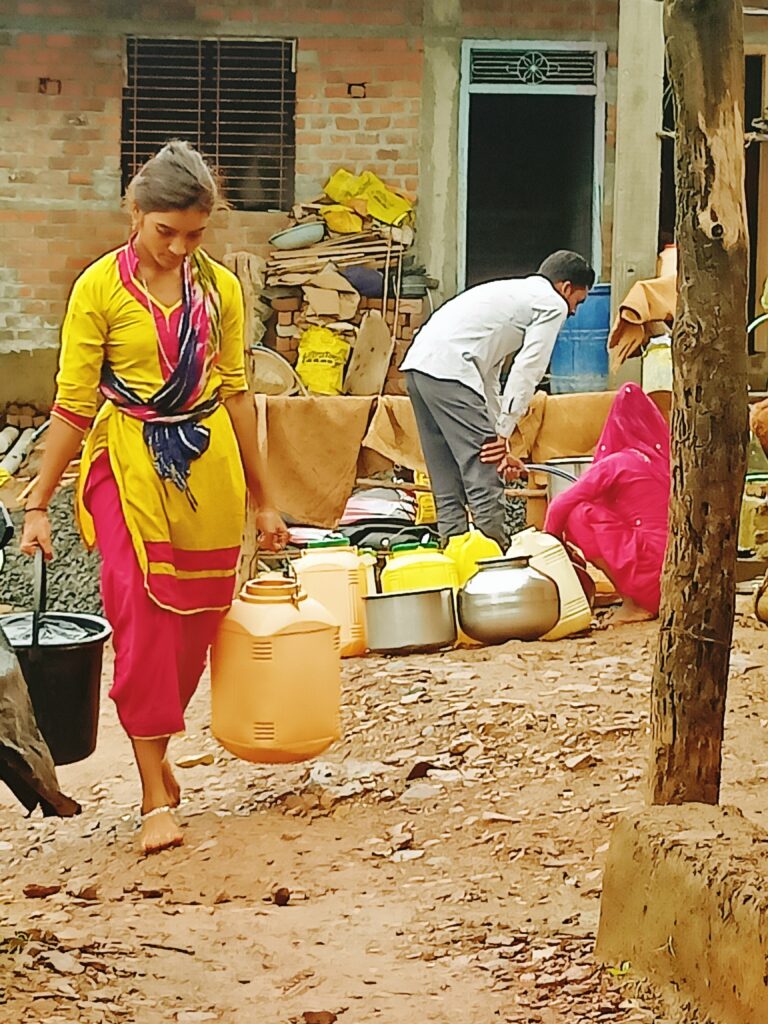
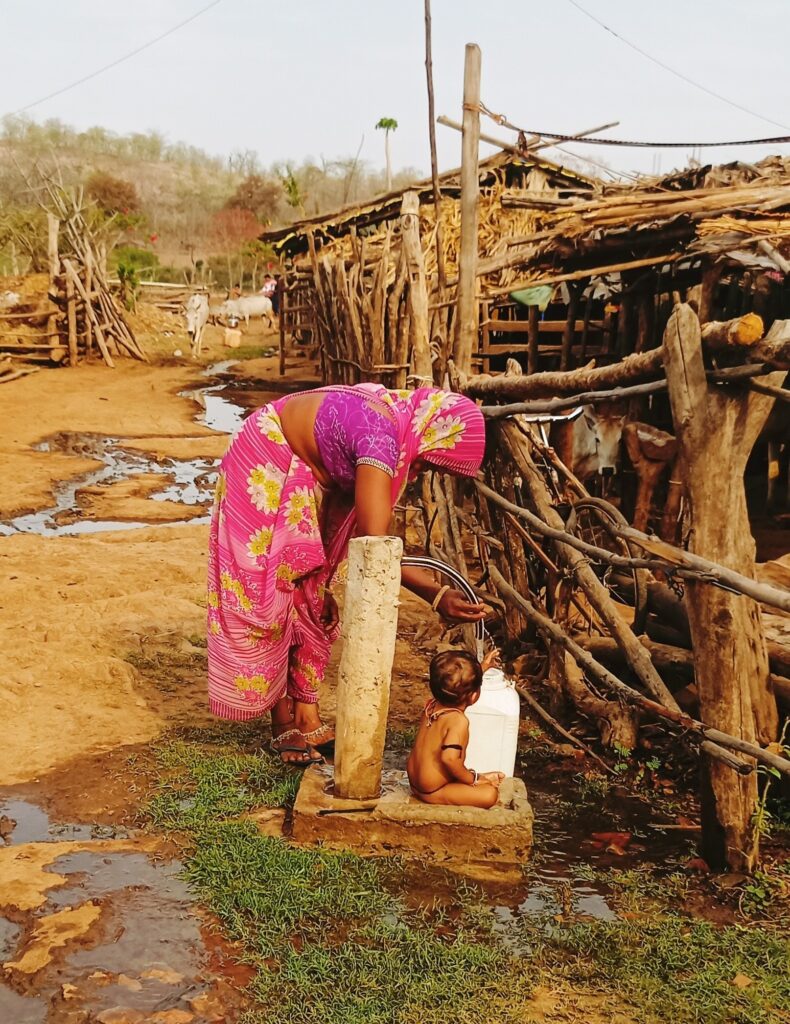
Nal Jal Yojna brings water to the homes
The women members of the village Self-Help Groups (SHGs) took on the task of finding a solution. During the Hissedari Sabha[2] they spoke to Samaj Pragati Sahayog’s Sunil Upadhyay about the water woes in their village. At his suggestion, they drafted a petition, which members went and delivered to the Sarpanch at the Gram Panchayat. Days passed, without any response. The Hissedari Sabha members just kept on reminding the Sarpanch and Secretary, which finally led to the borewell motor being repaired. This was not a long-term solution, however, as it ceased working again some four months later and trying to get the Sarpanch to have it fixed yet again was a futile task.
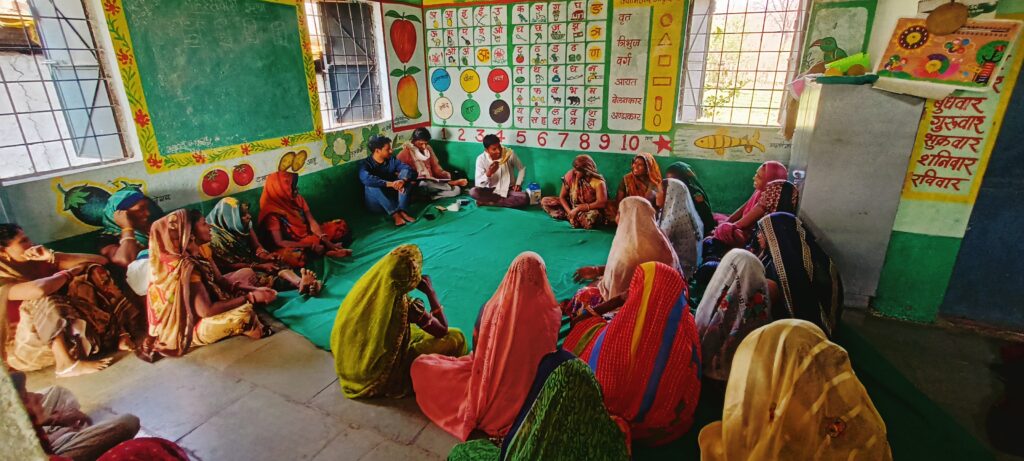
Women discuss water crisis with Sunil Upadhyay in the Hissedari Sabha
The village women resolved to find a permanent solution. During Hissedari Sabha discussions, they concluded that it was pointless to keep chasing the local bureaucrats. Since it seemed the problem could not be solved at the village level, they would take it to the officials of the PHE (Public Health Engineering)[3] Department of the Janpad (District) Panchayat, Kannod. Women from the Hissedari Sabha, along with other women from the village, decided to visit the Kannod office.
Kannod is some 28 km from Unhel, and no bus goes there via the village. When the women began to explore getting a tractor, the tractor owners all refused outright. At last they managed a tractor from another village, and that was how 18 women landed up at the offices of the Janpad Panchayat, Kannod. Here, they met the CEO (Chief Executive Officer) and informed him of the water problem in their village. After hearing them out, the CEO promised prompt action that would put an end to their difficulties. The women submitted a copy of their petition at the PHE office as well. The trip there and back cost them Rs 1,000, for which they pooled in their own money.
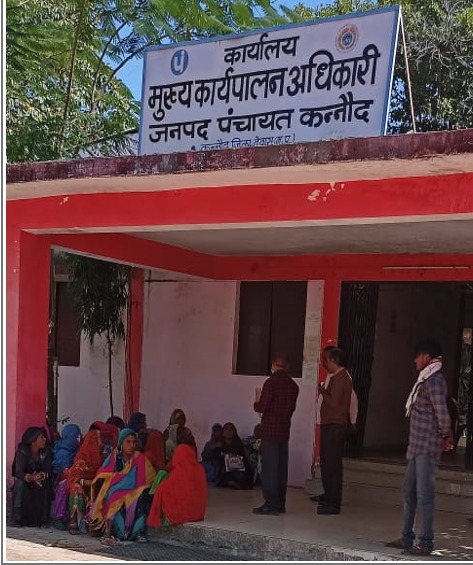
Women reach Janpad Panchayat at Kannaud to submit their petition
It soon came to the women’s ears that the Panchayat Secretary had forbidden the villagers to loan them a tractor. Anyone who helped the women could, he warned, forget about receiving funds from the Panchayat to build homes under the Pradhan Mantri Awas Yojana (the government’s housing subsidy scheme). And when the Secretary heard about the petition submitted to the PHE, he called organisation employee Sunil on the phone and threatened him, using abusive language and asking if Sunil wished to continue to be able to work in the village. He accused Sunil of coaching the women to go to Kannod and complain about him, the Secretary. Sunil informed him that the women had quite independently decided on going to Kannod, faced as they were with a problem in their village that the Sarpanch had failed to address.
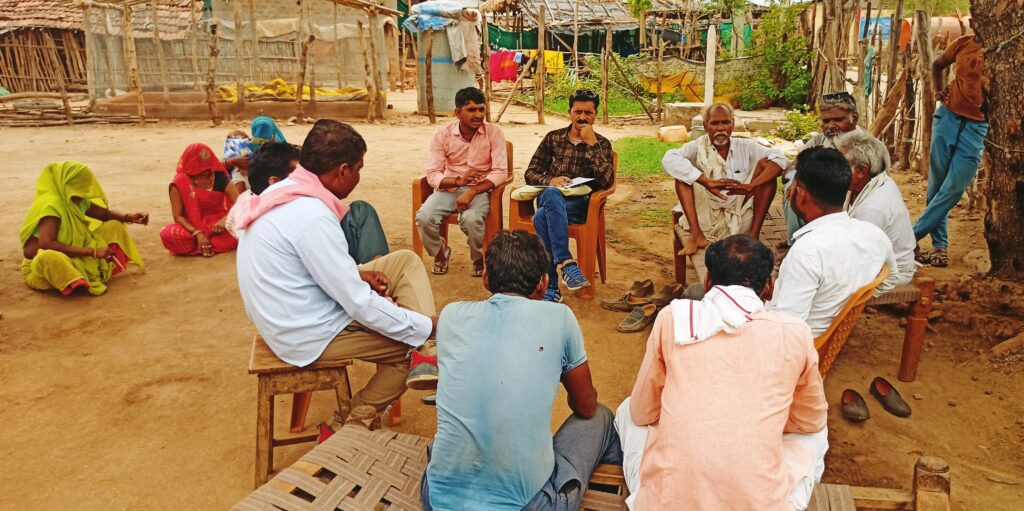
Janpad Panchayt CEO visits the village to discuss their water problem
Some three or four days after the women’s Kannod visit, officials from the District Panchayat arrived in the village. They went over the all the details of the problem with the women, and went away after assuring them of a speedy resolution. Another two or three months went by without any work being done. After having waited long enough, the women called up the PHE Department’s SDO (Sub-Divisional Officer) and told him not only about their water problem but also about their long-drawn-out attempts to have it solved. This time around, the women sensed that they had finally made an impact.
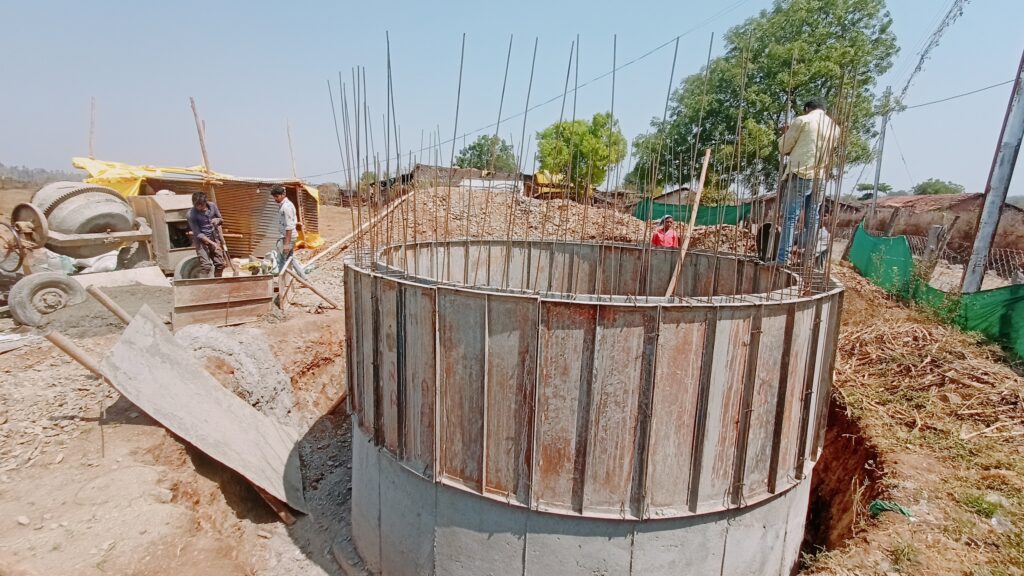
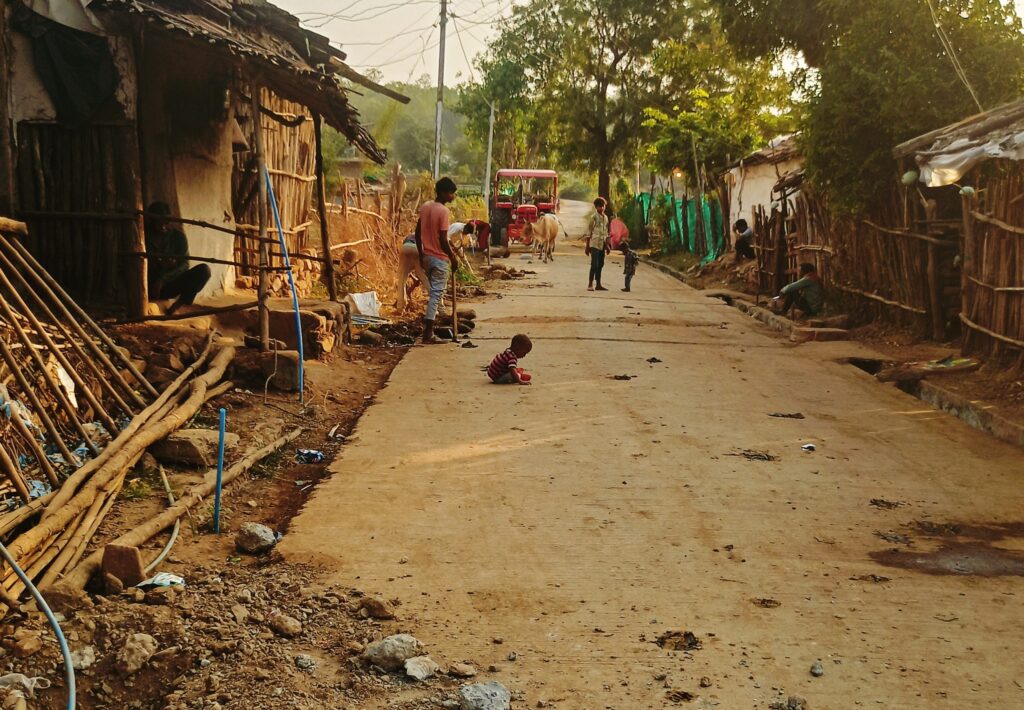
Water supply pipe lines being laid out
Just days later, digging work for the Nal Jal Yojana began throughout the village, and a tap connection was installed in every home. Given that the project was being carried out by a government contractor, its progress was slow. Whenever things came to a halt, however, the Hissedari Sabha members were quick to make a call to the PHE Department. Within a couple of months, a tank with a capacity of 4,000 litres had been constructed, and the existing borewell was equipped with a motor for filling the tank. And thus the Nal Jal Yojana was eventually implemented in the village. The women chose 9 AM and 5 PM as the most convenient times for getting water, given their work schedules as labourers and farm hands. A villager was given the responsibility of switching the motor on and off so as to fill up the tank at those times.
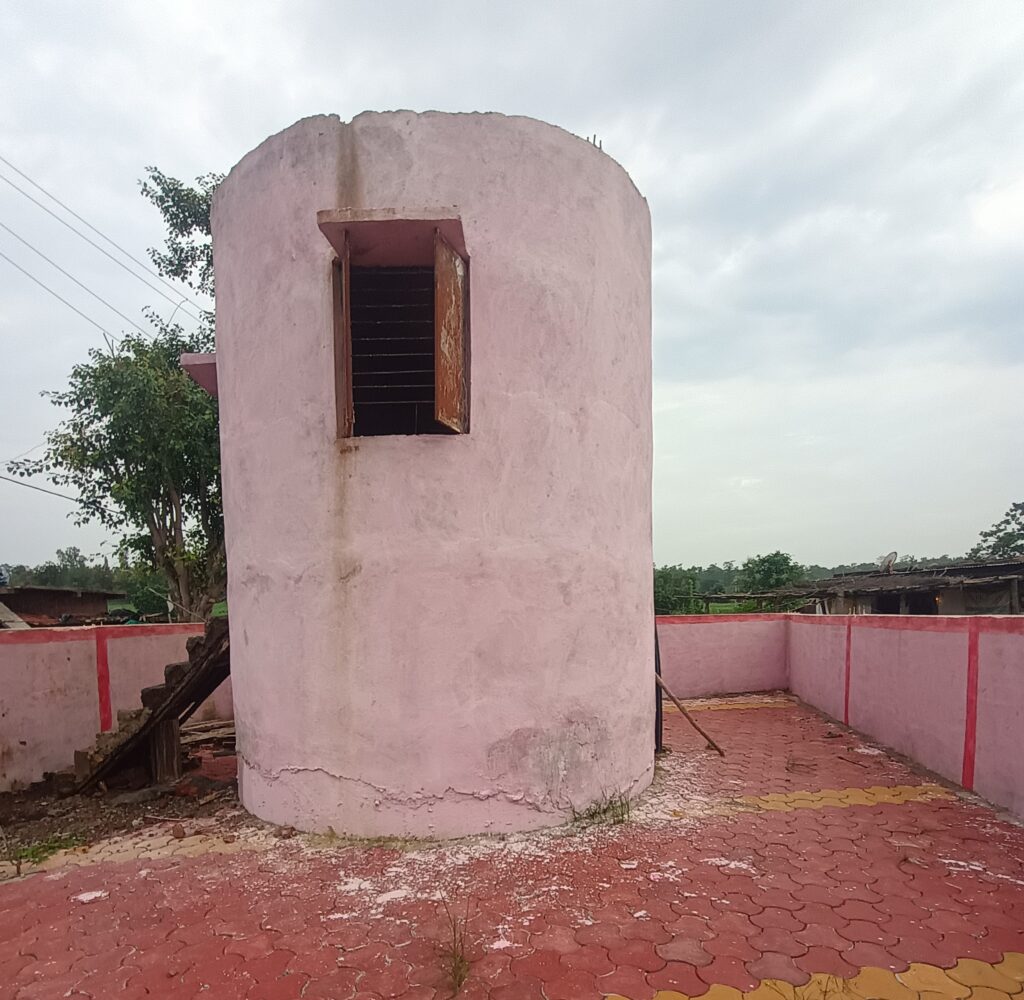
Water tank is ready
The women of Unhel village no longer have to carry heavy loads on their heads at the height of summer. Their struggle lasted two whole years, during which they had several confrontations with the Sarpanch and Secretary – on whom, the Hissedari Sabha members had come to realise, they simply could not rely. Only their own firm belief that they would succeed one day kept these women going.
[1] A part of the Jal Jeevan Mission (JJM) implemented by the Government of India since August 2019 in partnership with states, 'Nal Jal Yojana' or 'Har Ghar Jal' was conceived with the aim of supplying tap water to every rural household by 2024.
[2] Meetings organised by members of Self Help Groups (SHGs) to discuss various issues of concern for their villages – such as access to drinking water, PDS shops, toilets, pension schemes, PM Awas Yojana, etc.
[3] The PHE (Public Health Engineering Department) is responsible for overseeing the provision of safe and adequate drinking water in rural areas as per state government directions, installing and repairing handpumps, implementing and supervising schemes for groundwater recharging and augmentation, and for rainwater harvesting.
Writing: Sandip Bhati
Source: Sunil Upadhyay
Photography: Sudama Gurjar, Dharmendr Jhiloriya
Translation (Hindi to English): Smriti Nevatia
Guidance: Pinky Brahma Choudhary
